Last Updated on October 21, 2025
Knowing how old your boiler is can help you understand how efficient your system still is, whether it’s due for a service, and if a replacement could start saving you money on bills.
Many households across the UK are still running boilers that were installed more than a decade ago. Even if they’re working, older units often burn more fuel than necessary, lose heat through outdated components, and can struggle to maintain consistent water pressure. In most cases, a newer, high-efficiency model delivers the same comfort at a fraction of the running cost.
According to the Energy Saving Trust, replacing an old gas boiler with a new A-rated condensing boiler can save up to £500. This is based on July 2025 fuel prices and can vary depending on the size and thermal performance of your home.
But how can you find out how old your boiler is? This guide explores various ways to determine the age of your boiler and whether it’s time to plan for a modern upgrade.
🔥 Need a New Boiler? Get a Fixed Price in 90 Seconds
Don’t waste time phoning around — Heatable shows you the best boiler deals online in under two minutes. No sales calls, no hidden fees, just instant prices from a trusted installer.
Get Your Fixed Price Now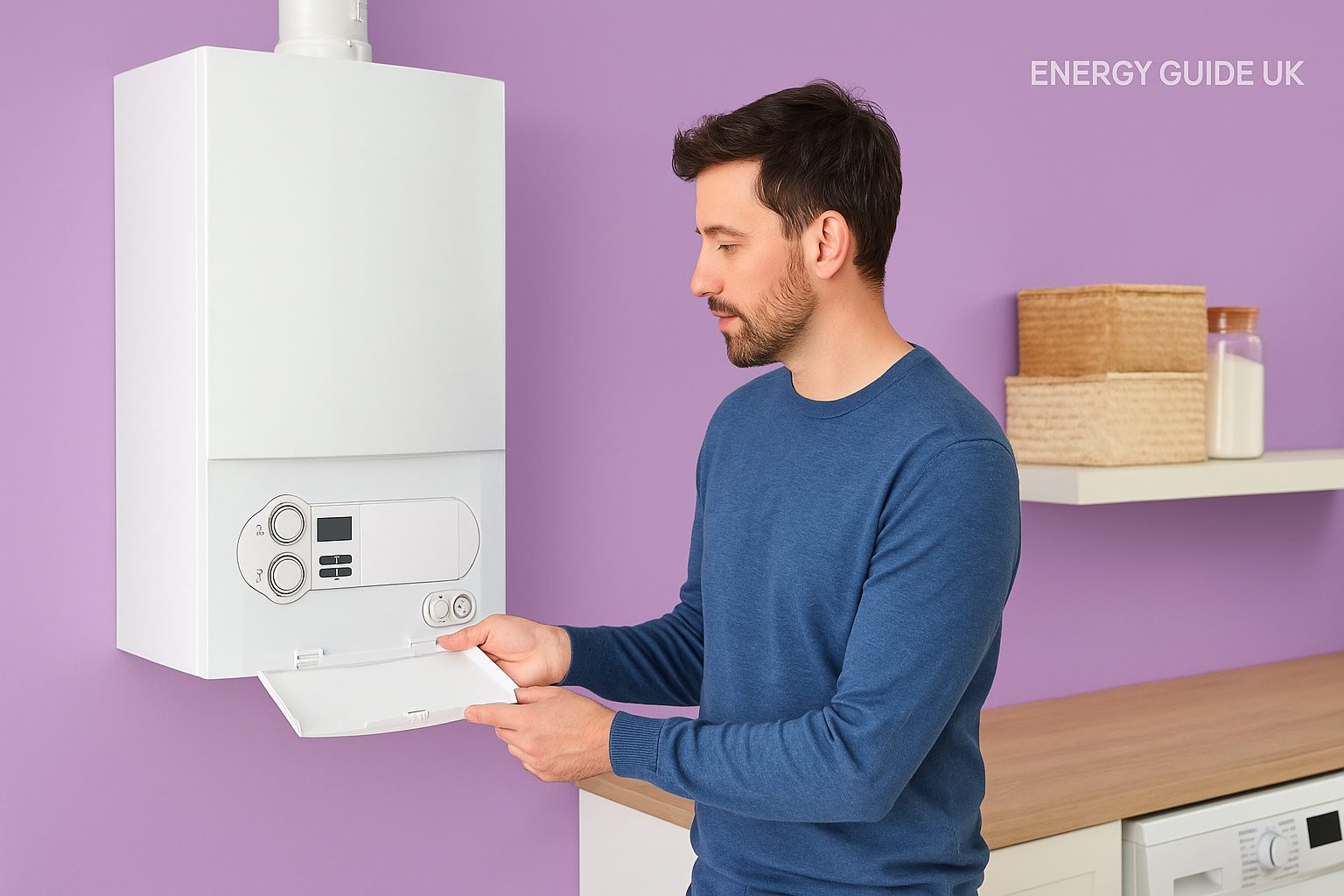
Key Takeaways:
- The easiest way to find your boiler’s age is by checking the serial number on the data plate or sticker.
- Manufacturers encode the production year into the serial number, though the format differs between brands such as Baxi, Vaillant, Worcester Bosch, and Ideal.
- Most boilers in the UK last 10 to 15 years before efficiency begins to decline.
- Older non-condensing boilers can waste more gas than modern A-rated condensing models and increase your carbon footprint.
- Replacing an ageing boiler can save you money on energy bills.
- If your boiler is more than 12 years old, noisy, or unreliable, it might be the right time to consider an upgrade.
Quick Ways to Tell How Old Your Boiler Is
There are several simple methods to work out when your boiler was made or installed, even if you don’t have the original paperwork.
The most reliable way is to check the serial number on the boiler itself. This short code is printed on a white or silver data plate, usually found behind the front panel, on the underside of the unit, or inside the drop-down cover. Once located, the serial number can be decoded to reveal the year and sometimes even the week of manufacture.
If you can’t find it, there are other ways to estimate your boiler’s age:
- Check your installation certificate or service record. Your Gas Safe installer should have listed the installation date.
- Look for a sticker or tag on the casing. Some installers write the installation date directly on the boiler when it’s fitted.
- Contact the manufacturer. Most major UK brands can confirm the production year if you provide the full serial number and model name.
For homeowners who inherited their boiler from a previous owner, these steps are usually all it takes to uncover its history. Once you know its age, you can decide whether it’s due for a service, still within warranty, or reaching the point where a replacement could make more financial sense.
Where to Find the Serial Number
Every boiler in the UK has a data plate or sticker that contains its model details and serial number. The serial number is usually a mix of letters and numbers, around 10 to 20 characters long, and it’s the key to unlocking your boiler’s true age.
Common places to look include:
- Front or side panel: Many modern boilers display a label along the casing.
- Underneath the boiler: You might find a white sticker near the pipe connections.
- Inside the drop-down cover: For boilers with a control flap, the serial code is often printed here.
- Behind the front casing: On some models, the data plate is located behind the removable front panel. However, you should never remove any covers that require tools or interfere with the gas components on your own.
If you can’t spot the sticker straight away, check any warranty cards, service booklets, or installation manuals. The serial number is often printed there, too.
Once you’ve found it, take note of the entire code, exactly as it appears. Even a single missing digit can change the meaning. With that serial number in hand, you can move on to the next step: decoding it to reveal when your boiler was made.
Boiler Age by Brand: Serial Number Breakdown
Every manufacturer uses a slightly different system for coding production dates into their serial numbers, meaning the same sequence of digits can have an entirely different meaning on another brand.
Once you’ve located yours, the guide below will help you interpret what the digits mean for each major UK brand.
Worcester Bosch
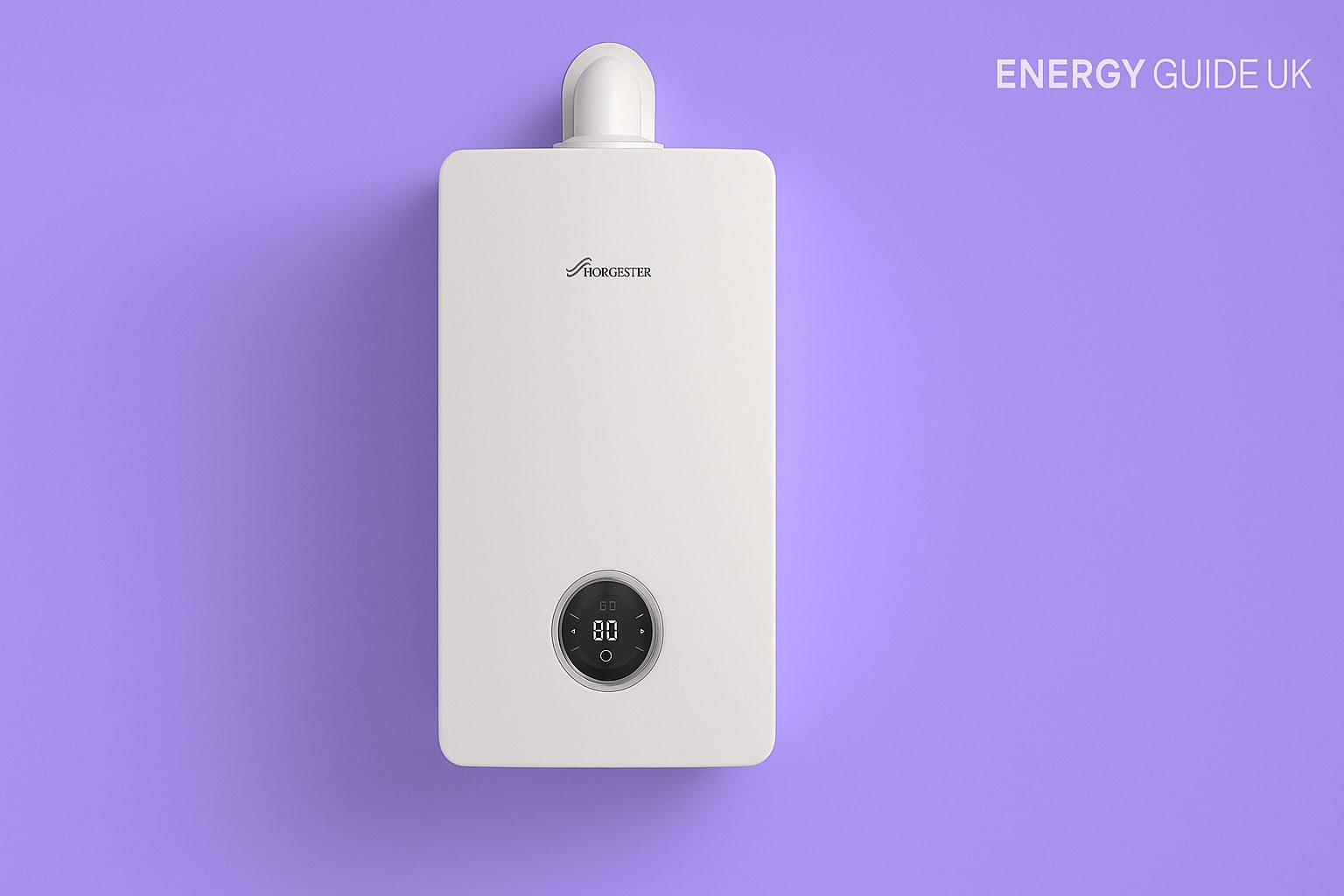
Worcester Bosch boilers are among the most common in UK homes. Their serial numbers vary slightly depending on the model and year of manufacture. Older boilers use one format, while newer condensing models follow another.
- Where to find it: On a white sticker inside the drop-down control panel, underneath the boiler, or behind the front flap.
- How to read it:
- For older models (pre-2010), digits 9–10 in the serial number represent the year of manufacture.
- For newer models (post-2010), digits 10–11 typically show the year.
- Example: 871611305123456 → digits 9–10 (“05”) show it was made in 2005.
Vaillant
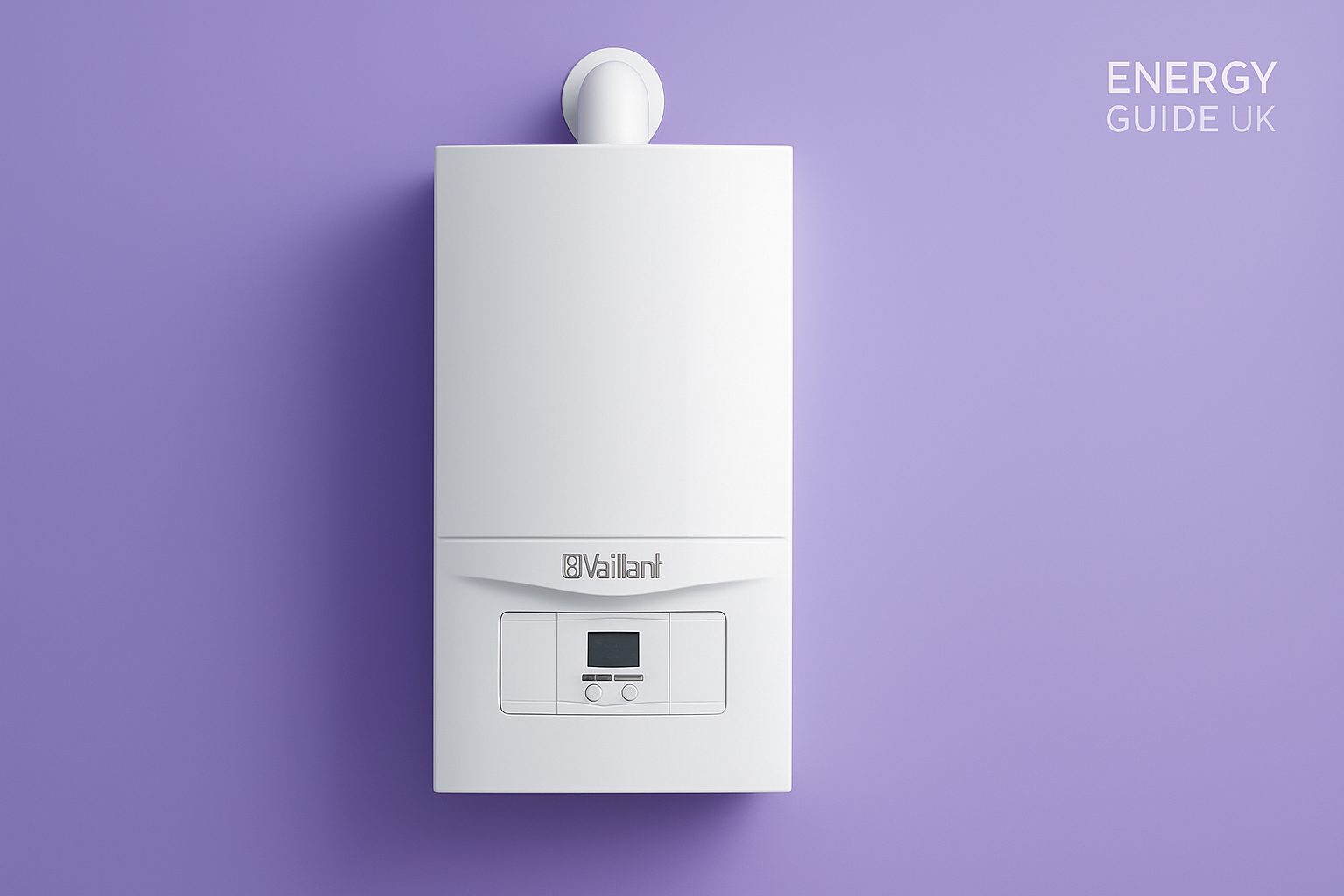
Vaillant’s serial numbers are straightforward once you know the pattern. The year and week of manufacture are built into the early part of the number, making it easy to pinpoint the production date with just a few digits.
- Where to find it: On a silver label at the top or bottom of the boiler casing.
- How to read it: The third and fourth digits show the year, and the fifth and sixth digits indicate the week of manufacture.
- Example: 2109123456 → digits 3–4 (“09”) mean 2009, and 5–6 (“12”) mean week 12.
Ideal
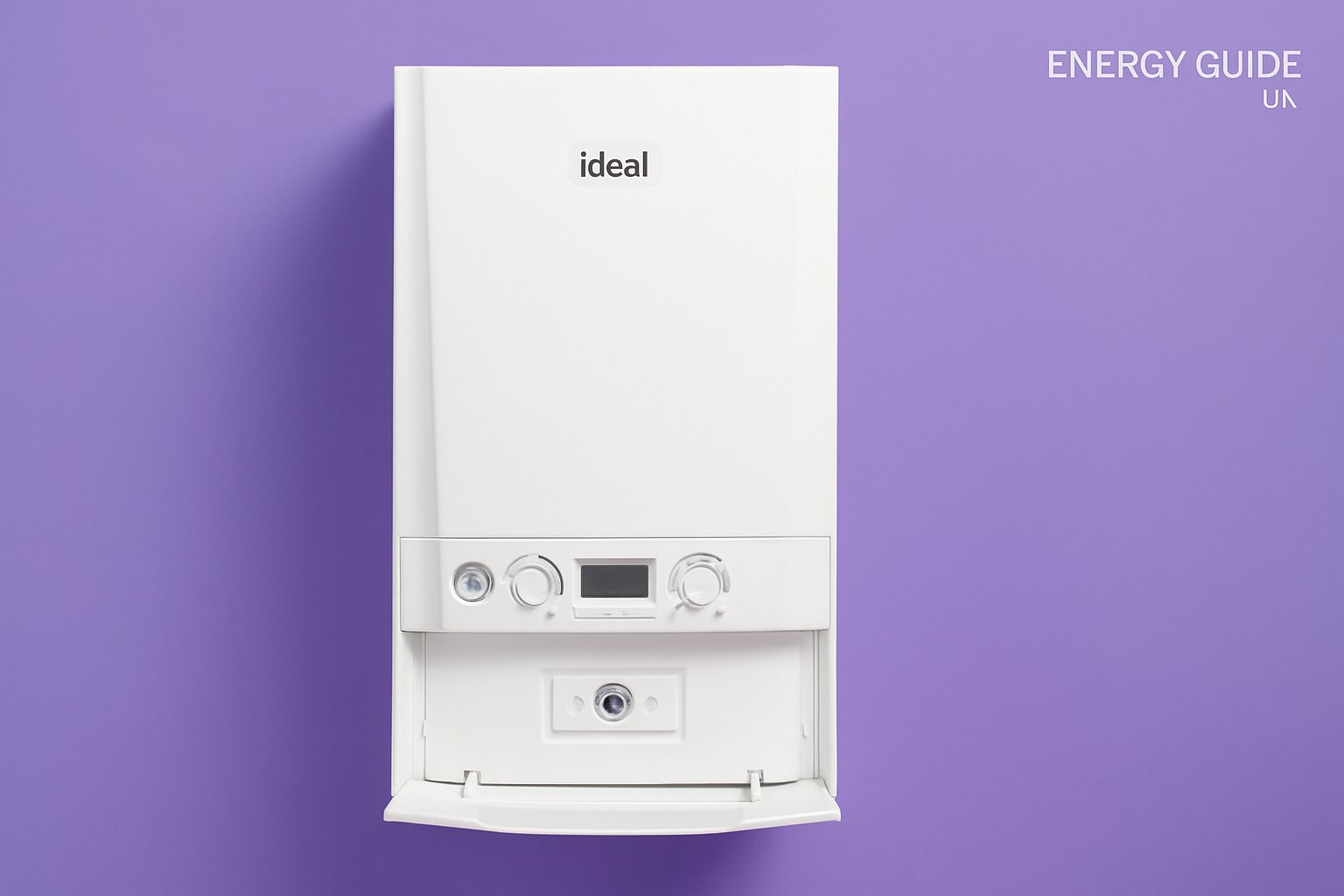
Ideal Boilers use several serial number formats depending on the model range, such as Logic, Vogue, or Classic. Modern models are easier to read, while older ones may need cross-checking with Ideal’s support team.
- Where to find it: On a white label beneath the boiler or inside the control panel door.
- How to read it: In most modern Ideal models, the last two digits represent the year of manufacture.
- Example: C03201512345 → the “15” near the end means 2015.
Baxi
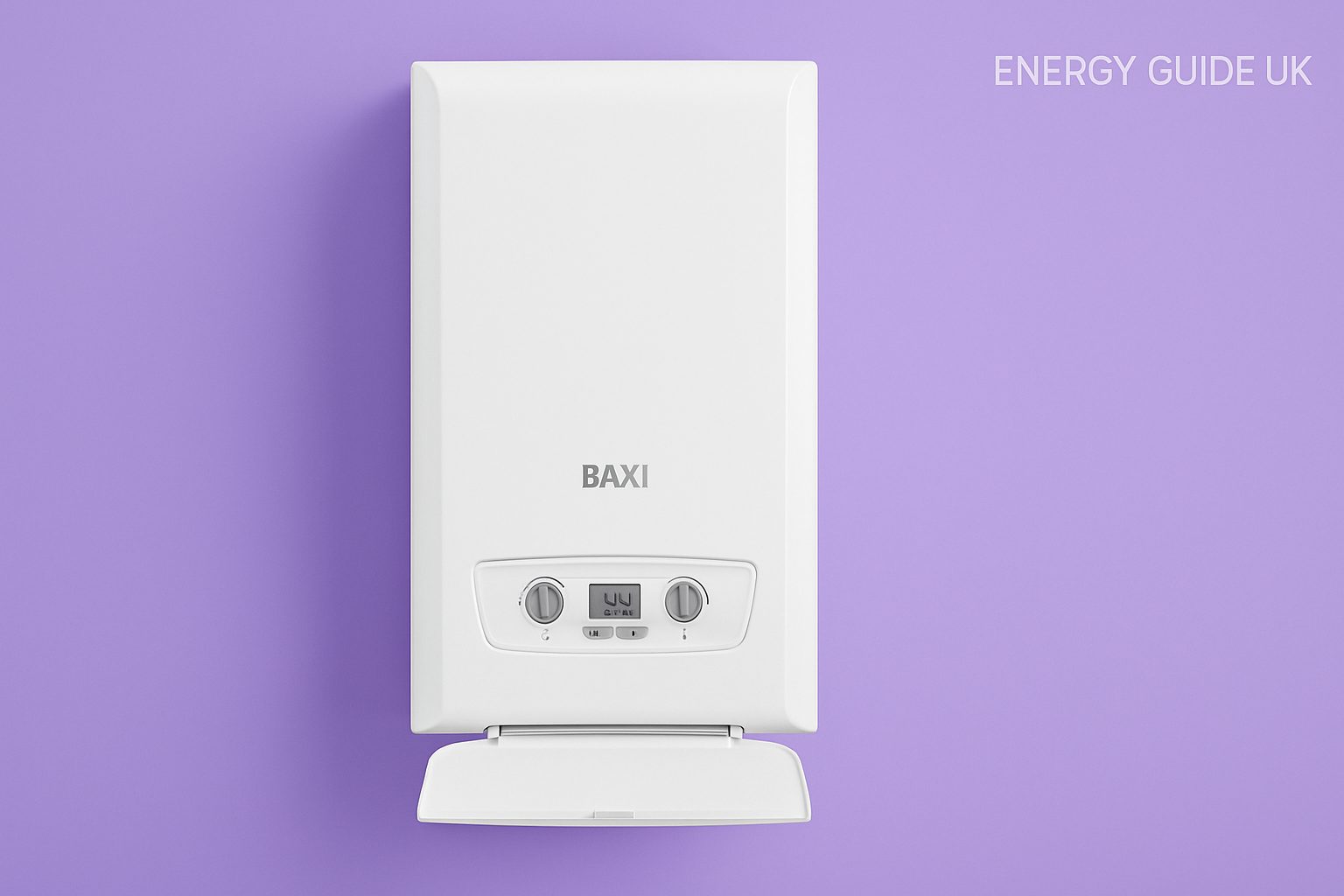
Baxi serial numbers are short and simple, and they’ve kept the same format across most of their range. The first two digits show the year, followed by the week number.
- Where to find it: Underneath the boiler casing or on the outer side panel.
- How to read it: The first two digits show the year, and the next two show the week of production.
- Example: 1610A12345 → digits 1–2 (“16”) = 2016, 3–4 (“10”) = week 10.
Other Common Brands
Some smaller or less common UK manufacturers follow similar serial patterns, but the digits vary slightly by model.
- Glow-worm: Digits 3–4 = year, 5–6 = week of manufacture.
- Vokera: Digits 5–6 = year.
- Ferroli / Alpha: Typically uses a six-digit code where the first two digits represent the year, and the next two represent the week.
If your boiler doesn’t match any of these formats, contact the manufacturer directly. Their technical support can confirm the exact date once you provide the full serial number.
Typical Boiler Lifespan and When to Replace
The Energy Saving Trust notes that the average lifespan of a boiler is 10-15 years. Efficiency gradually declines as internal parts wear out. How long a system truly lasts depends on its quality, usage, and maintenance history. A well-serviced unit can comfortably reach its 15-year mark, while one that’s neglected might start losing performance much sooner.
Average Lifespan by Boiler Type
| Boiler Type | Average Lifespan (Years) | Typical Signs of Ageing |
| Combi boiler | 10–12 | Irregular hot water, pressure loss, or noisy operation |
| System boiler | 12–15 | Slower heat-up time, corrosion on pipework |
| Regular (conventional) | 14–17 | Lower efficiency, frequent part replacements |
Over time, heat exchangers can corrode, seals begin to leak, and the system may need more frequent repairs. Even if it still runs, an older boiler can waste a significant portion of the fuel it burns.
If your boiler is approaching or past the 12-year mark, start monitoring its reliability and efficiency closely. Repairs may temporarily extend its life, but persistent faults, higher bills, or difficulty finding replacement parts are clear indicators that it’s time to consider a modern replacement. A newer boiler not only cuts energy costs but also improves safety, reduces emissions, and makes your home more comfortable year-round.
Wondering which boiler manufacturers performed best? Check out our best boiler brands guide for the full rundown. To determine the best boiler installation company, check out our Warmzilla and Boxt reviews.
Check out our video on how to vet boiler brands/models in the UK:
How to Estimate Boiler Age Without the Serial Number
If the sticker or data plate has gone missing, there are still ways to make an educated guess about your boiler’s age. A heating engineer can often tell within a few years just by looking at the design and technology used.
1. Look at the Boiler’s Design
Boilers have changed noticeably over time. Older models tend to be bulkier, with manual knobs and separate hot water cylinders, while modern combi systems are more compact and have digital displays or touch controls.
2. Check for a Visible Pilot Light
If your boiler has a small blue flame that stays on constantly, it’s likely more than 15 years old. Newer A-rated boilers use electronic ignition instead, which only lights when heat or hot water is needed.
3. Examine the Controls and Interface
Mechanical timers, dials, and analogue pressure gauges point to an older system. Modern boilers usually have LCD or LED screens and built-in diagnostic codes.
4. Review Your Home’s Energy Performance Certificate (EPC)
Your EPC may list the boiler type and estimated installation date if it was assessed after 2008. This can give a fairly accurate indication of its age and efficiency rating.
5. Ask a Gas Safe Engineer for a Professional Opinion
An experienced engineer can often identify the approximate age from the internal components, flue type, and model generation. They may also check the efficiency class and offer advice on whether servicing or replacing the boiler is the most cost-effective next step.
While these methods won’t provide an exact manufacturing date, they can give you a reliable estimate to help you decide whether your system is near the end of its lifespan or still running within its expected range.
Typical Boiler Lifespan and When to Replace
The Energy Saving Trust notes that the average lifespan of a boiler is 10-15 years. Efficiency gradually declines as internal parts wear out. How long a system truly lasts depends on its quality, usage, and maintenance history. A well-serviced unit can comfortably reach its 15-year mark, while one that’s neglected might start losing performance much sooner.
Average Lifespan by Boiler Type
| Boiler Type | Average Lifespan (Years) | Typical Signs of Ageing |
| Combi boiler | 10–12 | Irregular hot water, pressure loss, or noisy operation |
| System boiler | 12–15 | Slower heat-up time, corrosion on pipework |
| Regular (conventional) | 14–17 | Lower efficiency, frequent part replacements |
Over time, heat exchangers can corrode, seals begin to leak, and the system may need more frequent repairs. Even if it still runs, an older boiler can waste a significant portion of the fuel it burns.
If your boiler is approaching or past the 12-year mark, start monitoring its reliability and efficiency closely. Repairs may temporarily extend its life, but persistent faults, higher bills, or difficulty finding replacement parts are clear indicators that it’s time to consider a modern replacement.
A newer boiler not only cuts energy costs but also improves safety, reduces emissions, and makes your home more comfortable year-round.
Want to learn how to use your boiler better? Read our complete guide on boiler flow temperature, and how to optimise your boiler settings. You can also find out how much gas a boiler uses here.
Signs Your Boiler Is Nearing the End of Its Life
Even before a boiler completely fails, there are clear warning signs that it’s reaching the end of its serviceable years. Paying attention to these early indicators can help you plan ahead and avoid the sudden cost and inconvenience of a breakdown.
1. Rising Energy Bills
If your gas usage hasn’t changed but your heating costs keep climbing, your boiler could be losing efficiency. As internal components wear down, they burn more fuel to produce the same amount of heat.
2. Frequent Repairs
Needing to call an engineer several times a year is often a sign that your boiler is on borrowed time. Boilers have many moving parts that are regularly exposed to heat.
Over time, the parts deteriorate as a result of normal ageing and eventually fail, making it necessary to replace or repair them. The warranty for an old boiler will likely be voided, so you’ll have to pay for any major repairs and emergency call-outs.
Repair or part replacement costs can quickly add up and reach or exceed the costs of a new boiler. It can make more financial sense to replace your old boiler with a new model to avoid constant repairs and the inconvenience of an unreliable boiler.
3. Inconsistent Heating or Hot water
Fluctuating temperatures or slow-to-heat radiators suggest that your system is struggling to maintain output. Wear and tear on various components can make it harder to produce adequate heating and hot water. It can also be due to sludge buildup, failing pumps, or a tired heat exchanger.
4. Leaks, Noises, or Smells
Strange whistling, gurgling, banging, or clanking noises from your boiler can be a symptom of an aging boiler with underlying issues. It may mean limescale has built up over the years and is causing kettling, or your boiler has loose parts, trapped air, and other malfunctions.
Older boilers can also have poor combustion or gas leaks that can be serious and usually present peculiar smells. Leaks or unusual smells require immediate inspection by a Gas Safe engineer, and you should never ignore them.
5. Outdated Efficiency Rating
Boilers installed before 2005 are likely non-condensing and rated D or below on the efficiency scale. Even if they’re still running, they waste more heat and cost significantly more to operate.
6. Parts Are Harder To Find
If it’s becoming harder to find the right parts for your boiler, your heating system is very old. Manufacturers may no longer produce parts for considerably old boilers, so finding replacement parts can be challenging.
Parts unavailability is a sign you need to get a new boiler, especially if you’re using an old back boiler with outdated parts and features that can pose a safety risk.
If you’re seeing two or more of these symptoms, your boiler is likely approaching the end of its lifespan. Modern condensing boilers are quieter, safer, and can cut fuel consumption by up to a third. Replacing before a full breakdown also gives you more time to compare quotes and choose the right model for your home.
How Boiler Age Affects Energy Efficiency
A boiler’s performance declines gradually over time, even when it appears to be working normally. As internal components wear out, they transfer less heat to the water, forcing the system to burn more gas to achieve the same output. This slow loss of efficiency often goes unnoticed until energy bills begin to climb.
Modern condensing boilers are designed to capture and reuse heat that older boilers would simply lose through the flue. This process allows new A-rated models to operate at 90% efficiency or higher, compared with 60–70% for older non-condensing boilers. The difference can amount to hundreds of pounds each year on energy bills.
Other age-related factors also play a part:
- Corrosion and scale buildup inside the heat exchanger reduce heat transfer.
- Worn seals and valves cause small heat and water losses that lower performance.
- Outdated controls make it harder to maintain stable temperatures, often resulting in wasted energy.
The table below shows how efficiency drops as your boiler ages:
| Boiler Age | Efficiency Percentage | Efficiency Rating (ErP) |
| 0+ Years | 90% + | A |
| 10+ Years | 85% + | B/C |
| 15+ Years | 80% + | C/D |
| 20+ Years | 70% + | E/F |
| 25+ Years | 60% + | G |
If your boiler is more than 10 years old, it’s worth having an engineer check its efficiency rating during your next service.
Got a common boiler problem? Check out our quick-fix guide on boiler lockout, boiler ignition faults, boiler PCB faults, faulty diverter valves, and boiler timer issues.
How Much Does a New Boiler Cost?
Understanding how much a new boiler might cost is crucial not just for budgeting, but also for planning how soon an upgrade becomes worthwhile. The cost depends on several factors (type of boiler, brand, installation complexity, location), but here are current UK market benchmarks.
Typical Price Ranges in 2025
- For a straightforward, like-for-like replacement of a standard combi boiler: around £1,500 to £4,500, installed.
- For system or regular (“heat-only”) boilers: around £2,000 to £4,500+, installed, depending on the property size and system setup.
- On average, including installation, many UK homes are seeing total costs around £3,000 to £3,800 for a new gas boiler install.
Breakdown by Boiler Type
| Boiler Type | Typical Installed Cost* | Best For |
| Combi Boiler | £1,500 – £4,500 | Smaller to medium-sized homes, one bathroom |
| System Boiler | £2,000 – £4,000+ | Homes with multiple bathrooms, stored hot water |
| Conventional (Heat‐Only) | £2,000 – £4,500+ | Larger homes with tanks & cisterns |
*Price ranges are approximate and include both unit and installation costs. Additional upgrades or complexity will raise costs.
What Drives the Cost Higher?
Several key factors can increase the total cost of a boiler replacement:
- Installation complexity: If you’re switching from one type to another, like from system to combi, or relocating the boiler/fitting in a new place, expect labour and parts costs to rise.
- Brand & model choice: Premium brands or models with longer warranties often cost more.
- Additional components or upgrades: New flue, controls, pipework amendments, power-flush, or a smart thermostat.
- Regional labour costs: Installers in London and the South-East may charge more than in other areas.
What to Watch Out For
- Confirm with your installer what is included: supply of the boiler unit, labour, disposal of old boiler, any control-upgrades, flush of the heating system.
- Get at least two or three quotes to compare like-for-like what the job includes.
- Consider the long-term savings: a higher spend now may be offset by a more efficient boiler and lower fuel bills.
- Check the warranty length. Many good boilers come with 5-10 year warranties. Choosing a brand/model with a longer warranty may cost a little more up front, but it reduces risk.
Final Thoughts on How Old Your Boiler Is
Finding out how old your boiler is takes only a few minutes, and it can help you make smarter decisions about maintenance, efficiency, and long-term savings. Checking the serial number is the most reliable method, but even without it, you can estimate the age by looking at the design, controls, or service history.
Most boilers in the UK last between 10 and 15 years, though their efficiency begins to drop much sooner. If yours is older than a decade, struggles to heat your home evenly, or needs regular repairs, upgrading to a modern A-rated condensing boiler could reduce your annual gas use and cut energy bills.
New boilers offer major long-term benefits in comfort, reliability, and running costs. Checking your boiler’s age today can help you plan ahead and ensure your next winter is warm, safe, and energy efficient.
FAQs on How Old Is My Boiler
How Can I Check The Age Of My Boiler?
The quickest way is to look for the serial number printed on the data plate or sticker, usually found on the front, side, or underside of the boiler casing. Once you have the full number, check the manufacturer’s date code format. Most major UK brands use two digits to show the year of manufacture. You can also refer to service records, installation certificates, or contact the manufacturer directly.
At What Age Is A Boiler Considered Old?
A boiler is generally considered old once it reaches 12 to 15 years of age. Beyond this point, it tends to lose efficiency and may require more frequent repairs. Even if it still runs, an older G-rated boiler can waste 30–40% more gas compared to a modern A-rated condensing model.
Where Can I Find The Boiler Installation Date?
You can find it on your Gas Safe installation certificate, service record, or warranty documentation. Some installers also write the installation date on a sticker attached to the boiler. If you can’t locate it, check your building control records or contact the original installer.
How Long Is A Serial Number On A Boiler?
Most boiler serial numbers are 10 to 20 characters long and made up of both letters and numbers. The exact length varies by brand and model. Always copy the entire sequence, as even a missing digit can affect the date code.
Is A 20-Year-Old Boiler Too Old?
Yes, in most cases. A 20-year-old boiler is well beyond its typical lifespan and will be far less efficient than current A-rated models. It may still function, but will likely use much more gas, cost more to run, and be at a higher risk of breakdowns. Replacing it can cut energy costs and carbon emissions significantly.
How Do I Read My Serial Number?
Each manufacturer uses a different format. For example, Baxi uses the first two digits for the year, Vaillant uses the third and fourth digits, and Worcester Bosch uses the 9th–10th or 10th–11th digits depending on model age. Refer to your boiler’s brand guide to decode it accurately.
What Is The Lifetime Of A Boiler?
Most modern boilers last 10 to 15 years with regular servicing. System and conventional boilers can reach up to 17 years in some cases, while older non-condensing units may fail sooner. Regular maintenance, good water quality, and annual Gas Safe inspections help extend lifespan and maintain efficiency.
Sources and References
Energy Saving Trust – Boiler types explained
Energy Saving Trust – How to improve your EPC rating